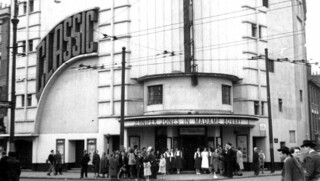Inflammable Films
Anna Aslanyan
An exhibition of pictures or other optical effects by means of a cinematograph, or other similar apparatus, for the purpose of which inflammable films are used, shall not be given unless the regulations made by the Secretary of State for securing safety are complied with.
The 1909 Cinematograph Act used the term ‘inflammable films’ in a literal sense – cellulose nitrate catches fire easily – but some local authorities interpreted it to mean ‘morally dangerous’, and it led to censorship. Still, the act wasn’t as confusing as the latest flurry of communication from the British government. One of its requirements was that exhibitors provide fire exits, which led to the emergence of purpose-built picture houses. Many of the buildings are still standing, though few of them are still cinemas.
The Rio in Dalston is 111 years old. In 1909, Clara Ludski, an auctioneer, commissioned the architect W.E. Trent to convert her shop into the Kingsland Palace of Animated Pictures. A few years later Ludski bought the properties on either side of her picture house and commissioned George Coles to make a larger, more ornate theatre. The Kingsland Empire opened in 1915. Ludski sold it in 1933, and it became part of the Classic Cinema chain. It was redesigned in 1936 by F.E. Bromige, who put a new, modernist auditorium nested inside the old one. Since its completion in 1937 the building has remained more or less unchanged. If you climb into the roof space you can see the old ceiling, covered in soot.
In the 1930s, Hackney had two dozen picture houses. They gradually closed with the arrival of TV, video and the internet; the Rio is the only survivor from that era. In 2017, the cinema – which is run as a charity – received a grant from the mayor of London, matched by donations, and was able to renovate the building. Its Art Deco facade is something of a local attraction, especially now that you can’t get inside.
British cinemas are unlikely to reopen before July, and many independents say they will remain closed at least until September. The Rio, like many cinemas, is insured by Hiscox. Although its policies include ‘forced closure due to the outbreak of an infectious disease’, the insurer initially said it doesn’t cover pandemics such as Covid-19 ‘due to the difficulty of insurers being able to quantify the potential risk’. But Oliver Meek, the Rio’s executive director, told me the cinema has since learned that it is entitled to compensation after all.
The Rio is introducing distancing measures to prepare for its eventual reopening. The old-fashioned box office will operate behind glass; a one-way system will make use of the emergency exits; lights will indicate when the toilets are free; some of the seats will be marked off with hazard tape.
Christopher Nolan’s Tenet, out in July, is the only big release that hasn’t been postponed yet. How will programming change after the lockdown? Meek mentioned an all-day screening of Normal People as a possibility for the Rio’s reopening. The only way indies can compete with chains is by diversifying their programme. In the 1970s, some of them became members’ clubs to circumvent censorship. The Tatler, for instance, showed Lenin in 1918 at its Charing Cross venue the same week its Dalston branch presented Altar of Lust and Sisters in Leather. In 1984, the Rio had Police Academy playing alongside Policing London, a short commissioned by the GLC. That made the distributor of the comedy angry: not for political reasons, but because the films were from different sources.
Tickets are not the main source of revenue for indies (and up to 60 per cent of box office takings goes to distributors). They organise community events; they sell drinks and popcorn – what if audiences are required to wear masks? Surveys suggest that people are keen to go to the cinema again. A fundraising campaign to support indies began last month with MUBI donating £10,000 to the UK Cinemas Fund.

Comments